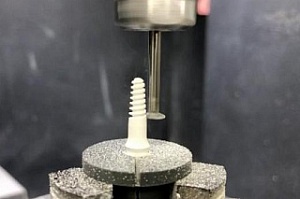TSU’s Research and Education Center (REC) Additive Technologies has developed a full-cycle technology for the production of dental posts (implants) from nanostructured ceramics that are biocompatible and aesthetically attractive for prosthetics. Small-scale production for dental clinics is planned for the technology site of the university’s small innovative enterprise.
Nanostructured ceramics based on ZrO2 (zirconium dioxide) is an advanced material in modern medicine. ZrO2 has been proven to have excellent strength, hardness, and biocompatibility. Dental implants made of zirconium dioxide do not cause allergic reactions and look as similar to natural teeth as possible.
The technology of manufacturing dental implants from powders of the Japanese company Tosoh was developed in a scientific group under the supervision of Vladimir Promakhov, deputy Director of REC Additive Technologies.
For the production of implants, a team of Tomsk developers uses CAD-CAM technology, which ensures the production of up to 100,000 units per month. TSU scientists worked with the nuances of the materials for 5 years. In particular, they achieved controlled shrinkage during sintering up to hundredths of a millimeter.
The TSU technology is able to adapt quickly to the needs of surgeons and dentists and produce products for their tasks. On their own technology platform, developers create implants of different shapes and sizes, with different threads and different shapes of the abutment (the head, on which the crown “sits”), and special keys with which surgeons screw them into the bone.
Now developers are negotiating with dental clinics that deal with dental prosthetics

